ADSactly Folklore - Venezuelan indigenous poetry
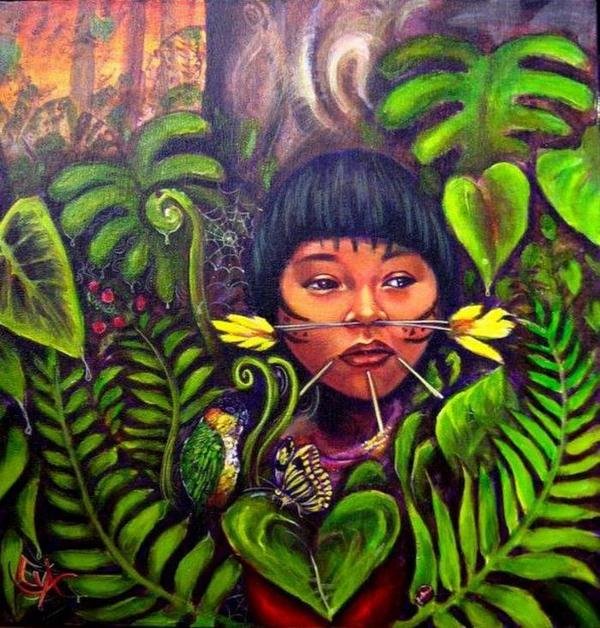
Venezuelan indigenous poetry

Hello, kind readers
Before moving on to the poems, I would like to tell you that according to some studies, it is believed that there are currently 26 different indigenous tribes in Venezuela: Akawayo, Añu, Arawak del Norte, Bari, Eñepa, Guajibo, Jodi, Kariña, Mapoyo, Pemon , Piaroa, Puinave, Pume, Saliva, Sape, Uruak, Warao, Wayuu, Yanomami, Yavarana, Yekuana, Yeral, Yurpa and South Arawak. There have also been many indigenous communities that have disappeared in the last two centuries, as many of them have adopted new customs and have moved to large cities. For example, the Cumanagoto community, of which my grandmother was, who adapted to the western social model and eventually lost not only their identity but also their territory.
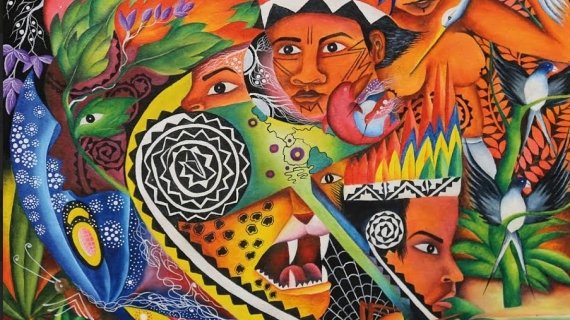
Of course, it is worth mentioning that there are some elements that remain intact of their culture, such as some foods and drinks, ornaments and musical instruments. What many have lost, perhaps as a result of the lack of interest of the ethnic groups themselves and the governments of the day, is the language, the language they used to communicate. Hence, I believe that any action to rescue part of the oral and written heritage of the natives, I find very important and invaluable.
Reviewing some books and pages, I found a sample of Venezuelan indigenous poetry. Too bad they were all translated and as we all know, many things and feelings can be lost in the translations. However, I will risk leaving some of them here to enjoy them. Let's start:
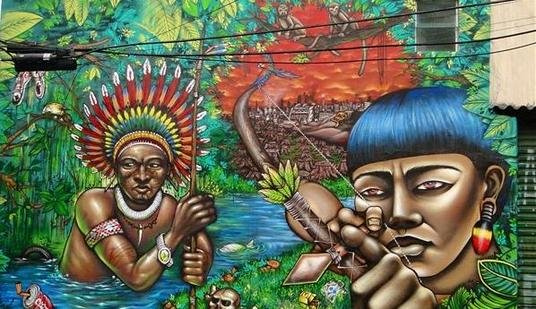
Poem of the Timotes
This poem is made by the Timoto Cuica tribe, considered one of the most advanced tribes in Venezuela. They had their territory between the states of Merida, Trujillo and Táchira. They were excellent potters and brave warriors; from that last facet this poem:
CANTO GUERRERO DE LOS TIMOTES
The wind runs fast; the water runs fast;
The stone that falls from the mountain runs fast.
Run warriors, flown against the enemy;
Fast run
like the wind
like the water
like the stone that runs off the mountain.
Strong is the tree that resists the wind
strong is the rock that resists the river;
strong is the snow of our páramos that resists the sun.
Fight, warriors, fight, Brave: show yourself Strong
Like the Trees,
Like rocks,
o Like the snows of the Mountains.
In this poem we can observe how the lyrical voice makes the comparison of man with nature, how the warrior must possess the virtues of what surrounds him. Nature is an example of strength, agility, fierceness, that is why men have to be like her in order to succeed, to succeed in the great battles. In indigenous literature in general, not only in Venezuelan literature, the tradition and the native cosmogonic richness of each of the ethnic groups is evident. It lets us glimpse the awareness that there is communion between man and nature.
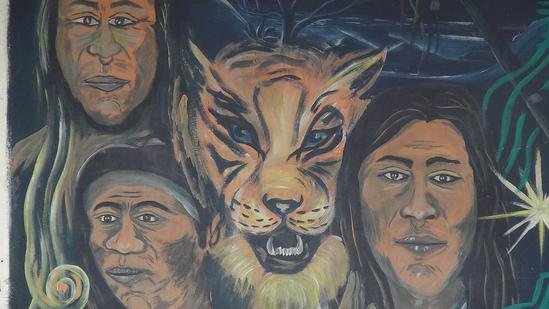
Warao Poem
The Waraos are a town of indigenous venezuelans who live in the southern part of the country, specifically in the Orinoco delta. Just as there are poems for war, there are poems made to lull children to sleep. Let's see an example:
Little brother,
Little brother,
sleep,
do not Cry.
If you keep crying
the tiger will come
for you
and he will eat you
The tiger does not come.
If you come, do not cry
or he will eat you.
Sleep
Here comes
on the cut leaves
from the moriche,
Sleep, sleep now.
One of the most common types of indigenous poems, are those that can work as lullabies. If we review the indigenous bibliography, there are many examples of poems that are children's songs, or at least they have all the air of the game, of the children's round. In this poem we see that the lyrical voice speaks of sleeping a brother, common activity in any family. In this poem we observe that the brother is asked to sleep or else a tiger will come and eat it. When reading this poem, I remembered my grandmother and her eternal ghost stories. The use of fear to control, to get them to do the right thing.
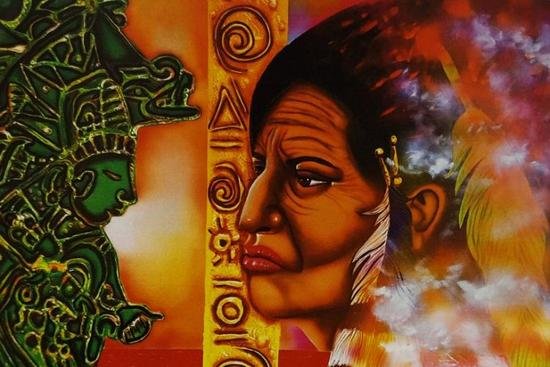
Poema Piaroa
The Piaroa is another indigenous town that lives on the banks of the famous Orinoco River. They are characterized by being peaceful and disciplined. From this tribe we rescued a love poem:
IF YOU LOOK AT ME
If you look at me
I am a red butterfly.
If you talk to me,
I am the dog that listens.
If you love me,
I am the flower that warms
in your hair
If you reject me,
I am an empty canoe,
dragged by the rivers
and that the stones destroy.
This poem, made from the enumeration and comparison, returns us the idea of communion between man and environment. The immediate reference of the indigenous man is nature, so it is her point of comparison, her image to metaphorize. The lyric voice speaks of how it feels when it is accepted by the beloved: beautiful natural images reflect the emotion, passion and joy that it feels; but in the end he also talks about how he feels when he is rejected: a boat empty and destroyed by nature.
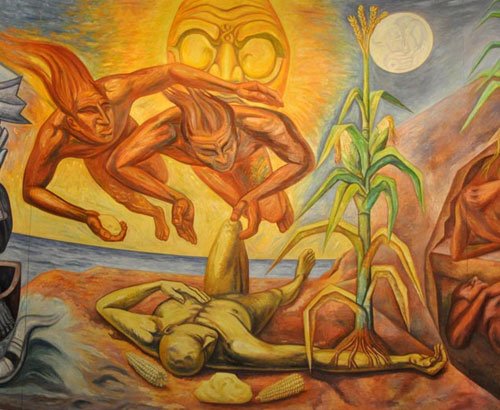
Wayúu Poem
This Venezuelan ethnic group has its territory in the Zulia state and are also called Guajiros. The Wayúu is the most numerous indigenous people of Venezuela and Colombia. From this town comes one of the most beautiful poems that I have read that speaks of life and death. I'll put some stanzas here:
THE DEATH GUAJIRA
A soul is united to each one of us.
She is like a small piece of white cotton,
like smoke
But nobody can see it.
...
Our soul follows us to all the parts,
as our shadow
Our soul leaves us only during sleep,
or when we are sick
...
The man who dreams that he dies does not wake up anymore.
His soul has left him forever.
He is still alive
But his soul is already very hurt.
The disease is there.
The dead is close.
This beautiful poem expresses the idea that this ethnic group has of soul and death. The soul is something that we can not see, that always accompanies us, but there are moments when the soul leaves us: in the dream and when we get sick. When man dreams that he dies, one way or another, he has begun to die, according to the Wayúu. Dreaming of death is related to illness, as if, in dreaming, we decreed death, we desired it. It is as if we were aware of it, only when we have little time left to live. When we begin to think about death, the soul flees, it goes away from us.
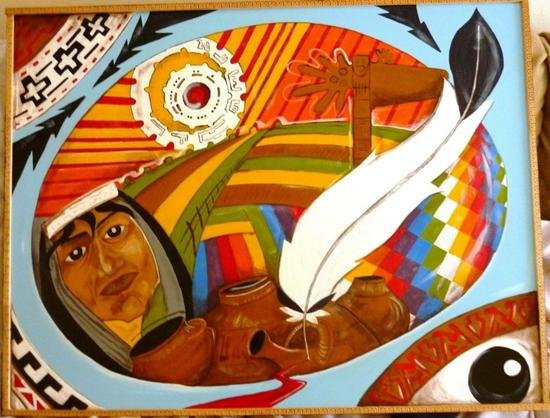
When reading this type of text, we might think that they lack the poetic value of other poems we have read, that there is a certain simplicity and no creativity in their verses. However, I would like to rescue the value of the look proposed by these texts, a view so alien to ours; also its marked metaphorical sense affirming the own thing, the supernatural, magical, forces capable of explaining your universe.
It would be interesting for indigenous youth to be interested in collecting the voice of the elderly, with the intention of rescuing the memory of the communities. Propose perhaps the dissemination and knowledge, within their indigenous communities and outside of them, about the importance of writing as a fundamental element to safeguard their history and wisdom. Perhaps in this way we can appreciate more texts like the previous ones and there are less possibilities for them to disappear as people.
I hope you have been interested in this topic. Remember to vote for @adsactly as a witness and join our server in discord. Until a next smile. ;)

BIBLIOGRAPHIC REFERENCE
https://es.wikipedia.org/wiki/Pueblos_originarios_de_Venezuela
https://theportugaldaily.wixsite.com/extra/single-post/2015/11/16/LITERATURA-IND%C3%8DGENA-DE-VENEZUELA-poes%C3%ADa-mitos-dramaturgia-y-cuentos
https://es.wikipedia.org/wiki/Timoto-cuicas
https://es.wikipedia.org/wiki/Waraos
https://es.wikipedia.org/wiki/Piaroas
https://es.wikipedia.org/wiki/Pueblo_way%C3%BA
Written by: @nancybriti
Click on the coin to join our Discord Chat

Witness proposal is here:
Go To Steem Witness Page
In the bottom of the page type: adsactly-witness and press vote.

Use small letters and no "@" sign. Or, click here to vote directly!
Thank you!
Español: Yanomami de amazonas en puerto ayacucho los he visto, también en Amazonas hay varias comunidades indígenas, a mi mama le encargaron una niña de 10 años para que la pusiera a estudiar ella es muy inteligente y ya aprendió español sus padres naturales siempre vienen a visitarla y la llaman ya tiene más de 3 años con mi mama. Una anécdota es que la trajimos a Puerto la cruz donde hay playa y se asustó al principio porque solo había visto rios su cara de asombro fue inmensa ....
English: Yanomami of amazonas in puerto ayacucho I have seen them, also in Amazonas there are several indigenous communities, my mother was commissioned by a 10 years old girl to put her to study she is very intelligent and already learned Spanish her natural parents always come to visit her and Call her she's already more than 3 years old with my mom. An anecdote is that we brought her to Puerto la Cruz where there is a beach and she was frightened at first because she had only seen rivers. Her face was astonished.
That's pretty inspiring
Thank you for your comment. I lived an experience similar to the one you narrate. The astonishment of some people make us look again at the things that we have in our environment and that perhaps we do not appreciate. Greetings
Dear @nancybriti, your post is a delight. And it sounds very close in your voice. I didn't know the poems you quote and they all seem beautiful to me, each in their own way: strength and grace for the warriors, persuation for the hungry child who doesn't want (and can't) sleep, tenderness for love, and the shadows of death.
Preserving this cultural heritage is essential, especially after so many years of increasing this historical debt in our country for so many years.
Thank you for sharing part of this inheritance (your close family inheritance), @nancybriti and @adsactly for publishing your text.
A hug!
The best thing about these poems is the musicality they possess when they are read aloud. A rhythm that sounds like a breeze, at a slow pace, like a big tree that gives shade. Thank you for having such enriching and encouraging comments, @adncabrera. Hugs for you too.
A beautiful image, @nancybriti: this is how the shadow of a tree should look like.
Venezuela libre! Fuera Maduro!
You make a very beautiful and necessary post, @nancybriti, because the literature of the autochthonous or aboriginal cultures of the American continent is very rich and deserves to be widely diffused. Particularly that of the ethnic groups that originally populated these lands that today are called Venezuela. Favorably, there have been dedicated researchers and compilers of that literature that was not written, but of oral tradition. You present us with a select and beautiful sample.
There is a very beautiful text that expresses one of the main myths of the Kunuhana ethnic group (called "makitare"), collected by Marc de Civrieux in his book Watunna, and that the writer Eduardo Galeano versinara. I allow myself to copiorate it:
Reading your commentary and Galeano's text, I remember many indigenous myths about the creation of man, about how the earth was populated. Maybe it would be interesting to share them around here. Thank you for your kind and accurate comments, @josemalavem.
wow beautiful art @adsactly
Thank you!
Glad to see people interested in Latin American culture.
Thank you for your comment
Hi, @adsactly!
You just got a 0.37% upvote from SteemPlus!
To get higher upvotes, earn more SteemPlus Points (SPP). On your Steemit wallet, check your SPP balance and click on "How to earn SPP?" to find out all the ways to earn.
If you're not using SteemPlus yet, please check our last posts in here to see the many ways in which SteemPlus can improve your Steem experience on Steemit and Busy.